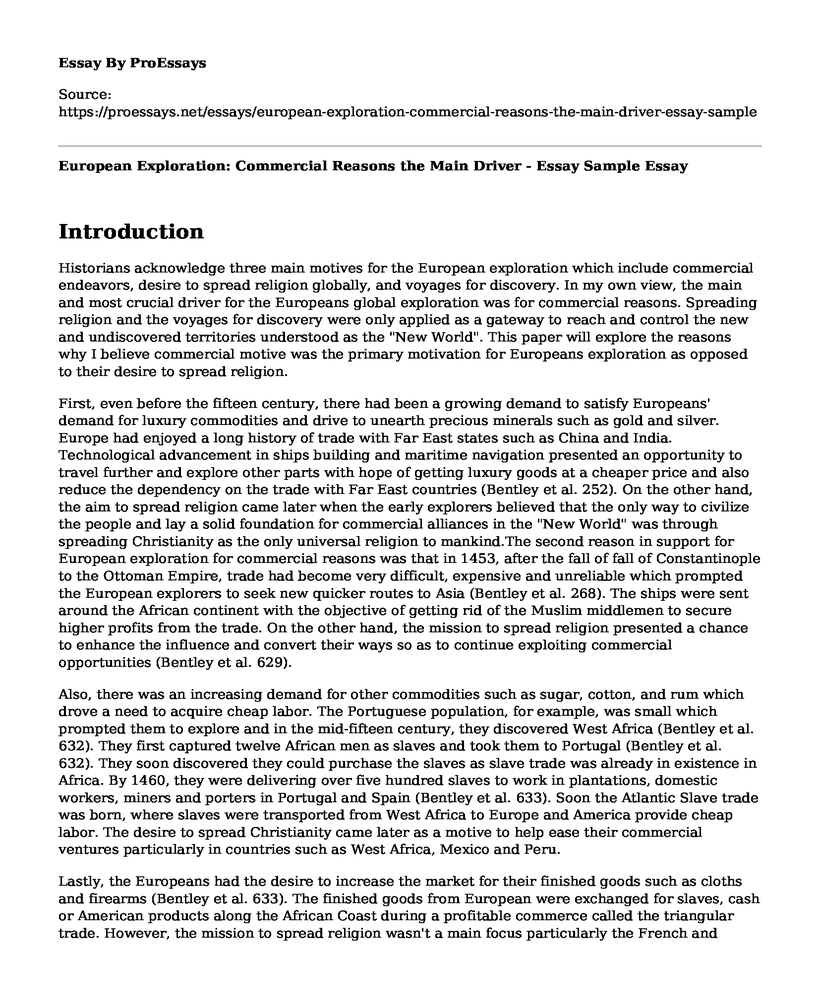Introduction
Historians acknowledge three main motives for the European exploration which include commercial endeavors, desire to spread religion globally, and voyages for discovery. In my own view, the main and most crucial driver for the Europeans global exploration was for commercial reasons. Spreading religion and the voyages for discovery were only applied as a gateway to reach and control the new and undiscovered territories understood as the "New World". This paper will explore the reasons why I believe commercial motive was the primary motivation for Europeans exploration as opposed to their desire to spread religion.
First, even before the fifteen century, there had been a growing demand to satisfy Europeans' demand for luxury commodities and drive to unearth precious minerals such as gold and silver. Europe had enjoyed a long history of trade with Far East states such as China and India. Technological advancement in ships building and maritime navigation presented an opportunity to travel further and explore other parts with hope of getting luxury goods at a cheaper price and also reduce the dependency on the trade with Far East countries (Bentley et al. 252). On the other hand, the aim to spread religion came later when the early explorers believed that the only way to civilize the people and lay a solid foundation for commercial alliances in the "New World" was through spreading Christianity as the only universal religion to mankind.The second reason in support for European exploration for commercial reasons was that in 1453, after the fall of fall of Constantinople to the Ottoman Empire, trade had become very difficult, expensive and unreliable which prompted the European explorers to seek new quicker routes to Asia (Bentley et al. 268). The ships were sent around the African continent with the objective of getting rid of the Muslim middlemen to secure higher profits from the trade. On the other hand, the mission to spread religion presented a chance to enhance the influence and convert their ways so as to continue exploiting commercial opportunities (Bentley et al. 629).
Also, there was an increasing demand for other commodities such as sugar, cotton, and rum which drove a need to acquire cheap labor. The Portuguese population, for example, was small which prompted them to explore and in the mid-fifteen century, they discovered West Africa (Bentley et al. 632). They first captured twelve African men as slaves and took them to Portugal (Bentley et al. 632). They soon discovered they could purchase the slaves as slave trade was already in existence in Africa. By 1460, they were delivering over five hundred slaves to work in plantations, domestic workers, miners and porters in Portugal and Spain (Bentley et al. 633). Soon the Atlantic Slave trade was born, where slaves were transported from West Africa to Europe and America provide cheap labor. The desire to spread Christianity came later as a motive to help ease their commercial ventures particularly in countries such as West Africa, Mexico and Peru.
Lastly, the Europeans had the desire to increase the market for their finished goods such as cloths and firearms (Bentley et al. 633). The finished goods from European were exchanged for slaves, cash or American products along the African Coast during a profitable commerce called the triangular trade. However, the mission to spread religion wasn't a main focus particularly the French and English who displayed little effort in spreading Christianity (Bentley et al. 613). They were only able to attract little converts compared to the Spanish explorers and missionaries in Mexico and Peru.
Works Cited
Bentley, Jerry H., et al. Traditions & Encounters: a Global Perspective on the Past. McGraw-Hill Education, 2016.
Cite this page
European Exploration: Commercial Reasons the Main Driver - Essay Sample. (2023, Feb 13). Retrieved from https://proessays.net/essays/european-exploration-commercial-reasons-the-main-driver-essay-sample
If you are the original author of this essay and no longer wish to have it published on the ProEssays website, please click below to request its removal:
- Was Reconstruction a Success or Failure?
- Marxism in Contemporary Societies Essay Example
- Persuasive Paper on Labor Outsourcing
- Essay Sample on Policy and Organizational Behavior
- Analysis Essay Sample on Greek and Roman Comedy Through the Works of Plautus
- Should Citizens be Required to Pass a Voter-Competency Before Casting Their Ballot?
- U.S Constitution: Origins, Roles & Duties - Essay Sample







